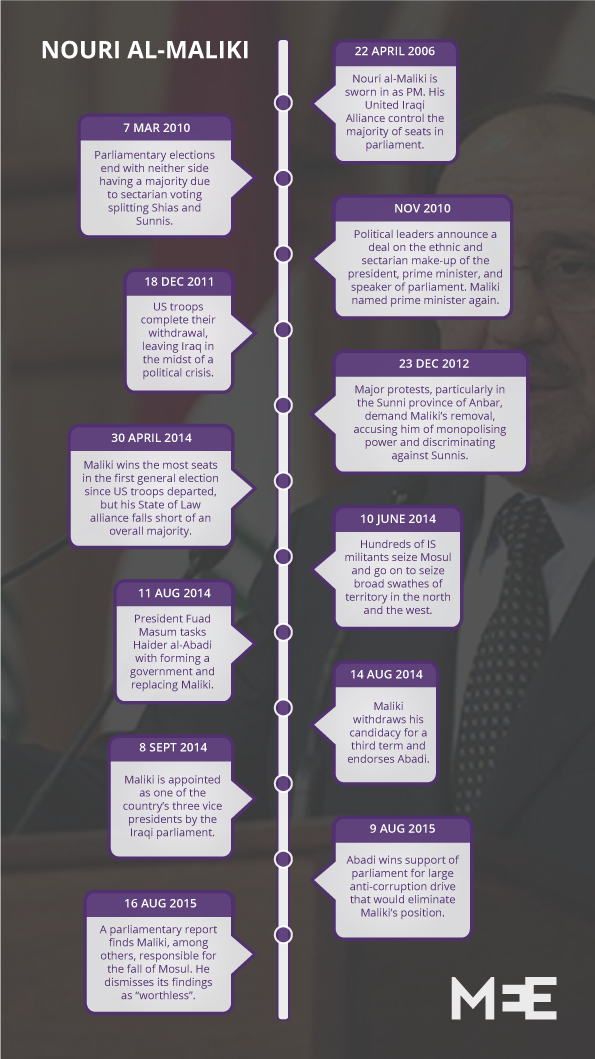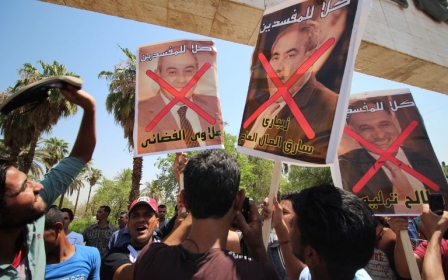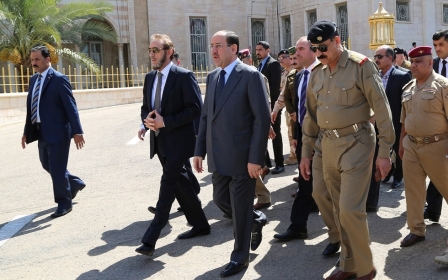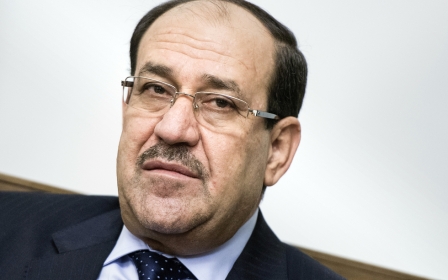ANALYSIS: Iraq's Maliki fights back after damning Mosul report
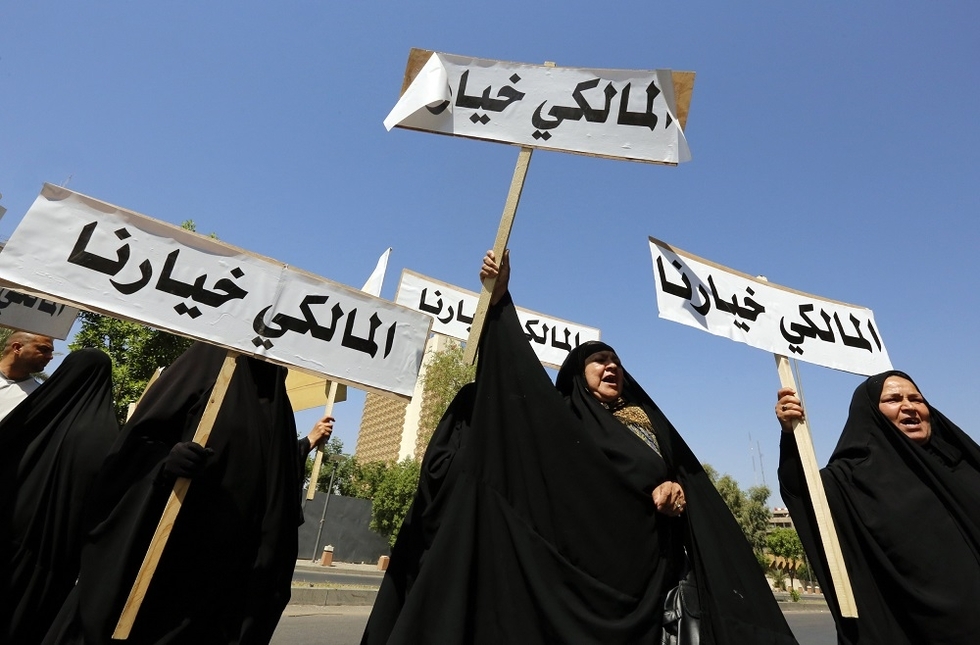
BAGHDAD – The future of former Iraqi prime minister, Nouri al-Maliki, has been a hot topic in Baghdad and beyond this week, with speculation running rife that he was not going to return from a trip to Iran in order to avoid the prospect of prosecution for his alleged part in the fall of Mosul.
However, lawmakers and jurists told MEE that despite the hype, Maliki is unlikely to be prosecuted for his alleged role in Mosul’s fall, with the former prime minister defying critics last night by returning from his trip as scheduled.
Maliki was pressured to step down last August after the Islamic State (IS) group swept through swathes of Iraq in just days, capturing the country’s second city, Mosul, and seizing stockpiles of high-tech US-made weapons.
While politicians, commentators and academics have long pointed fingers in attempts to explain the Iraqi army’s dramatic collapse in 2014, a recent parliamentary report has probably come the closest to apportioning blame and calling for action to be taken at the highest echelon of government.
After more than ten months of investigation, the security and defense parliamentary committee report concluded that a wide range of local, national and civilian officials must be held to account for the failure to put up any kind of real resistance in the face of the IS threat.
A copy of the report, seen by the Middle East Eye, indicated that "systematic and wide scale" administrative and financial corruption was the main reason for Mosul’s fall - charges that Maliki has dismissed.
It also said that Maliki, as the commander-in-chief and prime minister at that time, topped the list of defendants - which includes 35 officials most of whom were senior military leaders during Maliki's rule that began in 2006.
The accusations against Maliki include: appointing inefficient and corrupted commanders, neglecting the building of the Iraqi army capabilities, not paying attention to the training of the army and its qualitative arming, and not accounting the defeatists commanders in Mosul after Mosul’s fall on 10 June, 2014. The collapse of the Iraqi army in Mosul is further linked to a string of subsequent disasters including the massacre of 1,600 Iraqi Air Force cadets at the Speicher military camp, the enslavement of thousands of Yazidi women, the killing of tens of thousands of Iraqis and the displacement of more than three million others.
Despite this, Maliki has been able to retain huge influence in Iraq, and has on occasion successfully thwarted his successor Haider al-Abadi’s rule. After stepping down as prime minister, he was appointed as one of Iraq’s three vice presidents, and he remains the head of the Dawa Party, and the State of Law Coalition, the largest single bloc in parliament.
Many military commanders, senior judges and top officials within Abadi government are still loyal to Maliki and have been either rejecting or ignoring Abadi's orders since he took office last August. Abadi has on several occasions pointed to officials who are working to disrupt or delay his decisions, although he has fallen short of naming them.
Last week, however, he fired the general secretary of the cabinet, Hamid Khalaf, who is known by Iraqi officials as one of Maliki's men. It is unclear if Medhat al-Mahmoud, the head of the Iraqi Supreme Judiciary Council, who is also seen as one of Maliki's main supporters, will be next.
Ongoing anti-corruption protests have been calling for his removal, but the Maliki camp has thus far managed to hold out.
While Maliki's rivals tried to take advantage of his absence in recent days by promoting rumors about his permanent departure through social media, Maliki surprised critics by coming back to Baghdad late on Wednesday.
'Political termination'
According to Kadhim al-Shimari, a lawmaker and a member of the parliamentary legal committee, the report is damning but not legally binding.
"Legally, these recommendations are not binding to the judiciary. The committee has a right to accuse anyone based on its investigations but it has no right to convict him," Shimari told MEE.
"Based on the report of the parliament, Maliki is [a] delinquent but he is not convicted or accused until the judiciary issues an arrested warrant against him.”
Revealing the results of the investigation sparked widespread disagreements between the political blocs in Iraq, which have been sharing the top military and civilian posts in the government since 2004.
Maliki's State of Law Coalition members said that the rival members of the investigative committee were targeting their leader and were aiming to politically terminate him. They threated to resign from the parliament if the committee did not take Maliki's name off the defendants' list, something the committee ultimately refused to do.
"The committee did not accuse or exonerate anyone but some of the members of the committee have been promoting these accusations … this is illegal and it is a clear targeting for Maliki," Ali al-Maliki, a SOL lawmaker and Maliki's nephew told MEE by phone.
"The members of the committee are politicians and the committee has no legal or judicial consideration, so we rejected to form this committee by the parliament.”
"All what's going on, is a moral and political targeting for [former prime minister] Maliki," he added.
Iraqi parliament, on Monday sent copies of the report to the Judicial Council, the Office of the Prosecutor and the Integrity Commission. It did not discuss its findings to avoid stirring more disputes between the parliamentary blocs, with senior lawmakers suggesting that the report will soon be swept under the carpet.
"No one expected that Maliki will be touched based on this report. The judiciary council will just ignore this report or gain time by the procrastination," a senior Shia lawmaker talked in condition of anonymity told MEE.
"In fact, no one wants to sue Maliki, especially after he threatened to drag everyone with him and reveal the corruption files which he owned against most of the politicians who participating the political process since 2006.”
A few minutes after Maliki returned to Baghdad he rushed to reverse the tide, hitting back by threatening to reveal a cachet of files he gathered during his two terms as a prime minister, which he said would prove the involvement of senior officials, lawmakers, heads of blocs and clerics in corruption cases.
"We will disclose all the corrupted [people]… we do not have anything we [are] afraid to lose anymore and we will disclose everything for the public," Maliki said, talking to his coalition members who received him in the airport.
The report comes in the midst of a reform drive by Maliki’s successor Haider al-Abadi, who earlier this month pushed through a sweeping anti-corruption drive aimed at appeasing growing protests and curtailing rampant bureaucracy.
Abadi has asked to cancel the vice presidential posts as part of his reformist plan which he hopes will help to improve basic services and the help to quash finance and administrative corruption in various Iraqi ministries.
According to lawmakers, pressure to try Maliki, just a week after Abadi asked for his post to be remove, is clearly intended to limit his influence, but will not lead to Maliki’s prosecution, especially after his airport threats.
"He [Maliki] is very brave. He came back [to Baghdad] to face everyone," he said. "Our information suggesting that he is gathering his supporter and he will ask them to take to streets next Friday to show us what he can do," the Shia lawmaker said.
"Also, now all politicians are worry and wondering which files that he will use and against whom," he said.
New MEE newsletter: Jerusalem Dispatch
Sign up to get the latest insights and analysis on Israel-Palestine, alongside Turkey Unpacked and other MEE newsletters
Middle East Eye delivers independent and unrivalled coverage and analysis of the Middle East, North Africa and beyond. To learn more about republishing this content and the associated fees, please fill out this form. More about MEE can be found here.


